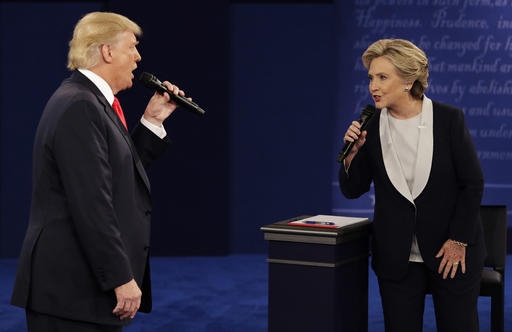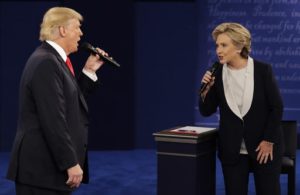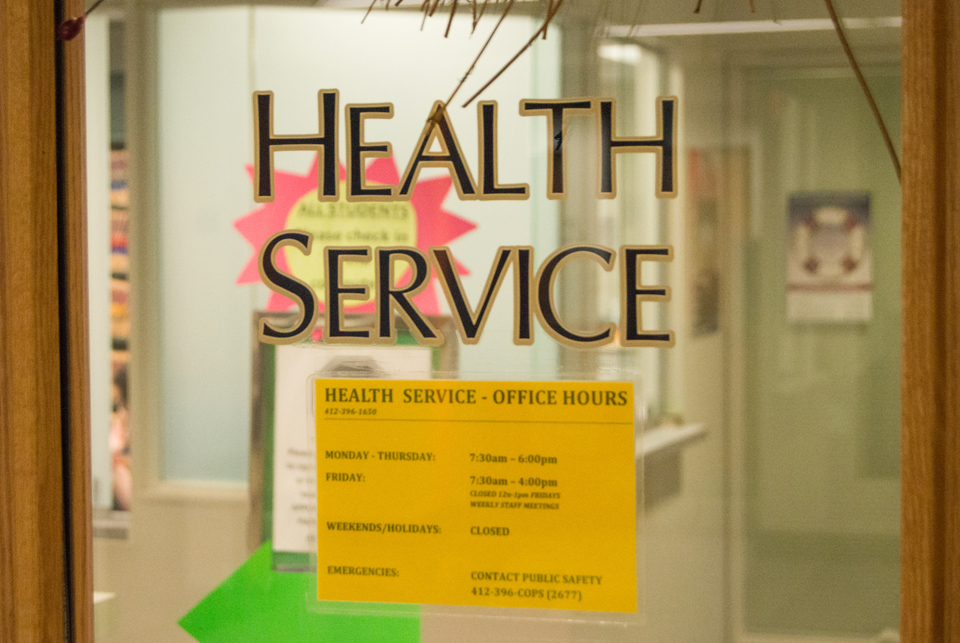

FILE – In this Sunday, Oct. 9, 2016, file photo, Republican presidential nominee Donald Trump and Democratic presidential nominee Hillary Clinton speak during the second presidential debate at Washington University in St. Louis. Trump gets outsized attention for what he’s tweeting and retweeting on a near-daily basis. But Clinton has a formidable digital media army, her own app and a rapid response team ready to blast out shareable soundbites from convention speeches, photos, videos and even temporary location-specific Snapchat filters mocking Republicans. (AP Photo/John Locher, File)
By Charlie Megginson | Staff Columnist
If you’re anything like the majority of America’s 18 to 24 year olds, Nov. 8 is just another day for you. According to the United States Census Bureau, just 38 percent of America’s 18- to 24-year-old voters participated in the 2012 Presidential Election. This election, even less will be voting. The third presidential debate was Secretary Hillary Clinton’s and businessman Donald Trump’s last chance to attract young voters.
They both failed.
The non-partisan Commission on Presidential Debates hosted three forums for the voters to hear the Republican and Democratic nominees make their cases to the nation. Former New Mexico Governor Gary Johnson, the Libertarian candidate, and Jill Stein, the Green Party candidate, were excluded from all three debates.
The first two forums consisted of interruptions, name calling, logical fallacies and factual misrepresentations. On Oct. 19, millions of undecided Americans tuned into the third and final presidential debate with hopes of being inspired and even swayed toward a candidate, and yet again, we’ve been disappointed.
Both Hillary Clinton and Donald Trump touted victories at the conclusion of the debate, leaving only one clear loser: We the People. Trump and Clinton are infamously the most unpopular presidential nominees in modern history. Nevertheless, many Americans still feel a deep civic and moral responsibility to participate in our democratic system.
Never before has participating in a democratic system been so personally conflictual.
Voters are looking for a reprieve from the mudslinging and vitriol that has defined the tone of this election. The third presidential debate was the final opportunity for the two presidential nominees to strike a peaceful and productive accord.
Instead what we witnessed was a reminder of the deeply flawed system which gave us Clinton and Trump. A system in which just 9 percent of the American electorate chose the two nominees. A system in which we are to choose a President who represents our values, but gives us two nominees, one of whom is a billionaire and the other whose campaign is financed by billionaires. A system which says that voting your conscience is wasting your vote.
Our system is broken, and the third presidential debate proves it.
While the debate was structured into six distinct topics, it didn’t take long for the nominees to fall off course. Try as moderator Chris Wallace might, he couldn’t stop Donald Trump from attacking Hillary Clinton, calling her a “nasty woman” or Clinton from calling Trump a “puppet.” These types of attacks alienate and disenchant voters who want accurate stipulations of fact and respectful ideological debates in response to those facts.
Voters aren’t just becoming jaded because of the venomous tone of the campaigns. On the issues, voters and their values are being left in the dust. Despite the fact that a plurality of the American people consider themselves independents, the two candidates advocated for the most extreme contrasting positions on issues.
On abortion, Trump hinted he might impose “some form of punishment” on women who seek abortions and Clinton advocated for the legality of abortion, all the way to the moment before the child is born.
On immigration, a tape was discussed in which Clinton advocates for completely open borders, and Trump said, “We have some very bad hombres here” and renewed his vow to build a wall on the Mexican border (and make Mexico pay for it).
On accepting the results of the election, Trump suggested he might not do that, saying, “I’ll keep you in suspense.” Clinton said that every losing nominee in history has accepted the results, though just two elections ago, Democratic Nominee Al Gore challenged the election results all the way to the Supreme Court.
Chances are that if you were undecided before the debate, you’re still undecided now. Neither candidate made any campaign-killing errors, but neither made an effective case for why he or she would be better for our nation and its future. With just a week until the election, young voters will be charged with making a most difficult decision. The unfortunate truth is that for many, the solution will be to not vote at all.
Staying home on Election Day cannot be the response to the three disastrous debates we’ve watched or the broader election. Young voters must remember that Election Day is about more than the presidency. In Pennsylvania, we’ll be electing our next United States Senator, many United States Representatives, the Commonwealth’s Attorney General, State Representatives and Senators. Collectively, these elected officials are far more powerful and affect change much more directly than the President.
While we may be disappointed in the tone of the presidential election, we must not associate that disappointment with democracy in general. Though our system has put us in a position where we once again feel the need to vote for the lesser of two evils, our system is one which also provides many safeguards to prevent evil from prevailing.



